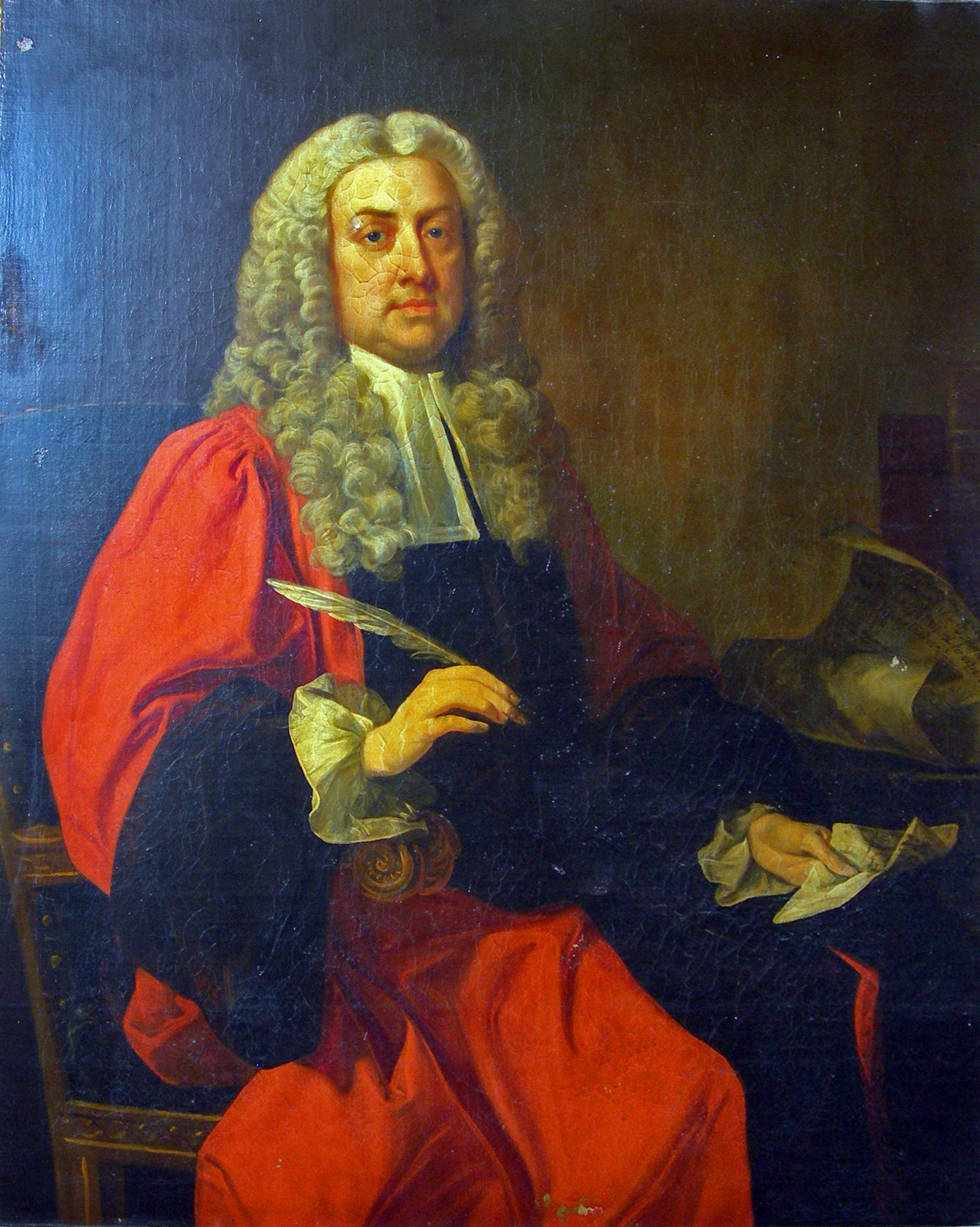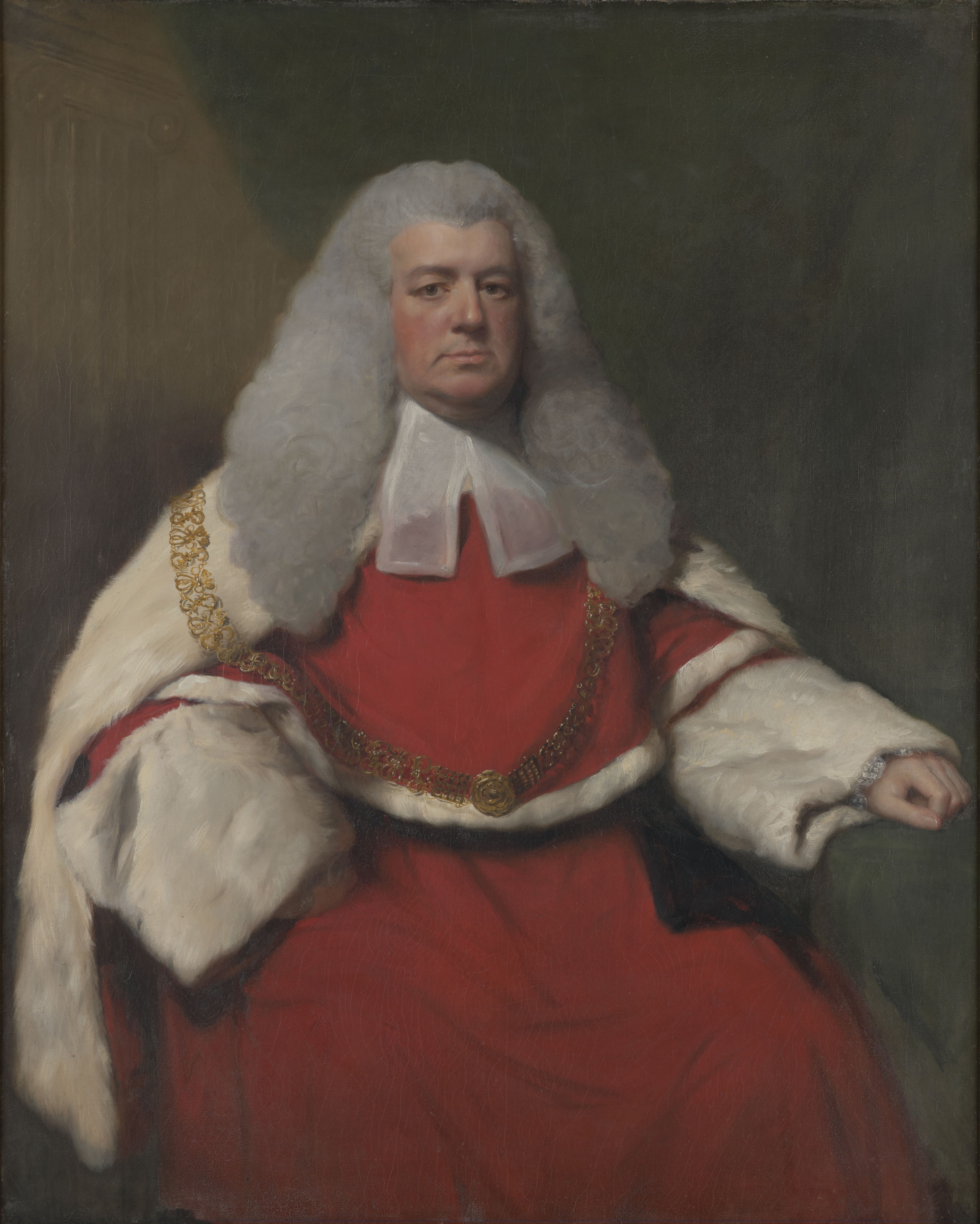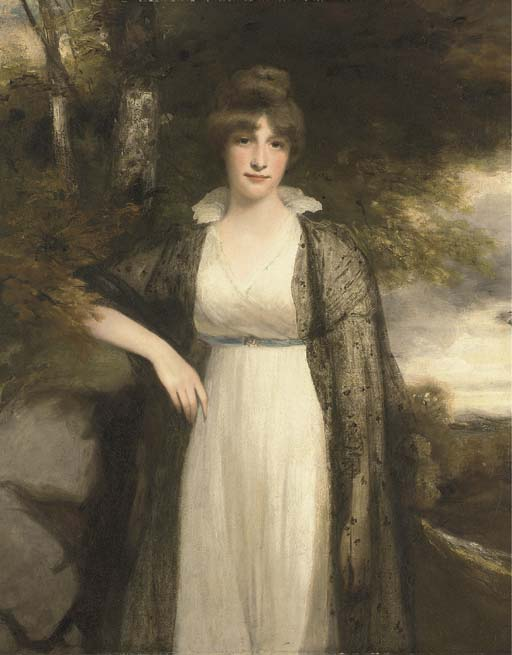|
John Skynner
Sir John Skynner, PC (1724 – 26 November 1805) was an English judge and politician who sat in the House of Commons from 1771 to 1777. He was born in London the son of John Skynner of Great Milton, Oxfordshire and educated at Westminster School and Christ Church, Oxford, where he matriculated in 1742. He entered Lincoln's Inn in 1739 to study law and was called to the bar in 1748. He became attorney-general to the Duchy of Lancaster from 1770 to 1777, made K.C. in 1771 and a bencher at Lincoln's Inn the same year. He was appointed recorder of Woodstock from 1771 to 1780, second justice of Chester from 1772 to 1777 and recorder of Oxford from 1776 to 1797. He was elected Member of Parliament for New Woodstock from 1771 to 1777. He gave up his seat in 1777: he was made a serjeant-at-law on 27 November 1777 and on 1 December was appointed Chief Baron of the Exchequer, a post he held until 1787, after which he was made a Privy Counsellor The Privy Council (PC), officia ... [...More Info...] [...Related Items...] OR: [Wikipedia] [Google] [Baidu] |
Her Majesty's Most Honourable Privy Council
The Privy Council (PC), officially His Majesty's Most Honourable Privy Council, is a formal body of advisers to the sovereign of the United Kingdom. Its membership mainly comprises senior politicians who are current or former members of either the House of Commons or the House of Lords. The Privy Council formally advises the sovereign on the exercise of the Royal Prerogative, and as a body corporate (as King-in-Council) it issues executive instruments known as Orders in Council which, among other powers, enact Acts of Parliament. The Council also holds the delegated authority to issue Orders of Council, mostly used to regulate certain public institutions. The Council advises the sovereign on the issuing of Royal Charters, which are used to grant special status to incorporated bodies, and city or borough status to local authorities. Otherwise, the Privy Council's powers have now been largely replaced by its executive committee, the Cabinet of the United Kingdom. Ce ... [...More Info...] [...Related Items...] OR: [Wikipedia] [Google] [Baidu] |
Bath, Somerset
Bath () is a city in the Bath and North East Somerset unitary area in the county of Somerset, England, known for and named after its Roman-built baths. At the 2021 Census, the population was 101,557. Bath is in the valley of the River Avon, west of London and southeast of Bristol. The city became a World Heritage Site in 1987, and was later added to the transnational World Heritage Site known as the " Great Spa Towns of Europe" in 2021. Bath is also the largest city and settlement in Somerset. The city became a spa with the Latin name ' ("the waters of Sulis") 60 AD when the Romans built baths and a temple in the valley of the River Avon, although hot springs were known even before then. Bath Abbey was founded in the 7th century and became a religious centre; the building was rebuilt in the 12th and 16th centuries. In the 17th century, claims were made for the curative properties of water from the springs, and Bath became popular as a spa town in the Georgian era. ... [...More Info...] [...Related Items...] OR: [Wikipedia] [Google] [Baidu] |
1724 Births
Seventeen or 17 may refer to: *17 (number), the natural number following 16 and preceding 18 * one of the years 17 BC, AD 17, 1917, 2017 Literature Magazines * ''Seventeen'' (American magazine), an American magazine * ''Seventeen'' (Japanese magazine), a Japanese magazine Novels * ''Seventeen'' (Tarkington novel), a 1916 novel by Booth Tarkington *''Seventeen'' (''Sebuntiin''), a 1961 novel by Kenzaburō Ōe * ''Seventeen'' (Serafin novel), a 2004 novel by Shan Serafin Stage and screen Film * ''Seventeen'' (1916 film), an American silent comedy film *'' Number Seventeen'', a 1932 film directed by Alfred Hitchcock * ''Seventeen'' (1940 film), an American comedy film *''Eric Soya's '17''' (Danish: ''Sytten''), a 1965 Danish comedy film * ''Seventeen'' (1985 film), a documentary film * ''17 Again'' (film), a 2009 film whose working title was ''17'' * ''Seventeen'' (2019 film), a Spanish drama film Television * ''Seventeen'' (TV drama), a 1994 UK dramatic short starring Chris ... [...More Info...] [...Related Items...] OR: [Wikipedia] [Google] [Baidu] |
Sir Francis Buller, 1st Baronet
Sir Francis Buller, 1st Baronet (17 March 1746 – 5 June 1800) of Churston Court in the parish of Churston Ferrers, of nearby Lupton in the parish of Brixham, and of Prince Hall on Dartmoor, all in Devon, was an English judge. Origins Buller was born at Downes House in the parish of Crediton in Devon, a younger son of James Buller (1717–1765), of Downes and of King's Nympton Park, both in Devon and of Morval in Cornwall, a Member of Parliament for Cornwall, by his second wife Lady Jane Bathurst, daughter of Allen Bathurst, 1st Earl Bathurst. As his elder brothers inherited the substantial family estates, Buller as a younger son was obliged to make his own fortune, which he achieved both from his brilliant legal career and from having married a wealthy heiress. Career Legal career After an education at The King's School, Ottery St Mary in Devon, and at Christ's Hospital, London, in February 1763 he entered the Inner Temple as a pupil of William Henry Ashurst, s ... [...More Info...] [...Related Items...] OR: [Wikipedia] [Google] [Baidu] |
Puisne Justice Of Chester
The Justice of Chester was the chief judicial authority for the county palatine of Chester, from the establishment of the county until the abolition of the Great Sessions in Wales and the palatine judicature in 1830. Within the County Palatine (which encompassed Cheshire, the City of Chester, and Flintshire), the Justice enjoyed the jurisdiction possessed in England by the Court of Common Pleas and the King's Bench. While the legal reorganisation of Wales and the Marches under Henry VIII diminished the authority of the Earl of Chester (i.e., the Prince of Wales) in the County Palatine, the authority of the Justice was, in fact, increased. In 1542, the Great Sessions were established in Wales, that country being divided into four circuits of three shires each. Denbighshire, Flintshire, and Montgomeryshire were made part of the Chester circuit, over which the Justice presided. Under Elizabeth I, a second justice was added to each of the Welsh circuits, after which the senior and ... [...More Info...] [...Related Items...] OR: [Wikipedia] [Google] [Baidu] |
Taylor White
Taylor White (21 December 1701 – 27 March 1772) was a British jurist, naturalist, and art collector. A Fellow of the Royal Society, he was the patron of several prominent wildlife and botanical artists including Peter Paillou, George Edwards, Benjamin Wilkes, and Georg Dionysius Ehret. He was also a founding governor of the Foundling Hospital in London and served as its treasurer for many years. Early life and legal career Taylor White was born at his family's seat in Wallingwells, a hamlet in northwest Nottinghamshire. He was one of the five children, and the second son, of Thomas and Bridget (''née'' Taylor) White. His father was for many years the Member of Parliament for East Retford and in 1717 was appointed Clerk of the Ordnance. His maternal grandfather, Richard Taylor, was the High Sheriff of Nottinghamshire and had also served as the Member of Parliament for East Retford.Betham, William (1805)''The Baronetage of England'' Vol. 5, pp. 500–504. Miller White was a ... [...More Info...] [...Related Items...] OR: [Wikipedia] [Google] [Baidu] |
James Eyre (judge)
Sir James Eyre PC, (17341 July 1799) was an English judge, the son of the Rev. Thomas Eyre, of Wells, Somerset. Biography He was educated at Winchester College and at St John's College, Oxford, which he left without taking a degree. He was called to the bar at Gray's Inn in 1755, through the influence of Thomas Parker, chief baron of the exchequer. He commenced practice in the lord mayors and sheriffs courts, paying £63 (''2011: £'') for one of the four counsel to the City of London Corporation. He was appointed Recorder of London in 1763 and knighted in 1770. He was counsel for the plaintiff in the case of ''Wilkes v. Wood'', and made a brilliant speech in condemnation of the execution of general search warrants. His refusal to voice the remonstrances of the corporation against the exclusion of Wilkes from Parliament earned him the recognition of the ministry, and he was appointed a Baron of the Exchequer in 1772 and Chief Baron of the Exchequer in 1787. From June 1792 ... [...More Info...] [...Related Items...] OR: [Wikipedia] [Google] [Baidu] |
Sydney Smythe
Sir Sidney Stafford Smythe, PC, KC (1705 – 2 November 1778) was an English judge and politician. Early life Born in London, he was descended from Customer Smythe and Waller's " Sacharissa". His father, Henry Smythe of Old Bounds in the parish of Bidborough, Kent, died in 1706, aged 29. His mother, Elizabeth, the daughter of Dr. John Lloyd, canon of Windsor, then became the wife of William Hunt, and died on 6 October 1754. Smythe was admitted to St John's College, Cambridge, as a fellow-commoner on 1 July 1721, and graduated B.A. in 1724. Having entered the Inner Temple on 5 June 1724, he was called to the bar in February 1728, and joined the home circuit. In 1740 he was appointed steward of the court of the king's palace at Westminster, in place of Sir Thomas Abney, and in Trinity term 1747 he was made a King's Counsel, and became a bencher of the Inner Temple. He was elected a Fellow of the Royal Society in 1742. At the 1747 British general election Smythe was returned to ... [...More Info...] [...Related Items...] OR: [Wikipedia] [Google] [Baidu] |
George Parker, 4th Earl Of Macclesfield
George Parker, 4th Earl of Macclesfield PC (24 February 1755 – 20 March 1842), styled Viscount Parker between 1764 and 1795, was a British peer and politician who sat in the House of Commons between 1777 and 1795. Background Macclesfield was the son of Thomas Parker, 3rd Earl of Macclesfield, and Mary, daughter of Sir William Heathcote, 1st Baronet. Political career Macclesfield was returned to Parliament for Woodstock in 1777, a seat he held until 1784, and later represented Minehead between 1790 and 1795. In 1791 he was sworn of the Privy Council and appointed Comptroller of the Household, which he remained until 1797. In 1795 he succeeded his father in the earldom and entered the House of Lords. From 1804 to 1830 he held office as Captain of the Yeomen of the Guard under eight different prime ministers. During the French Revolutionary War he raised the County Fencible Cavalry in Oxfordshire, later the Watlington Cavalry, precursor of the Oxfordshire Yeomanry, and was ... [...More Info...] [...Related Items...] OR: [Wikipedia] [Google] [Baidu] |
William Eden, 1st Baron Auckland
William Eden, 1st Baron Auckland, PC (Ire), FRS (3 April 174528 May 1814) was a British diplomat and politician who sat in the House of Commons from 1774 to 1793. Early life A member of the influential Eden family, Auckland was a younger son of Sir Robert Eden, 3rd Baronet, of Windlestone Hall, County Durham, and Mary, daughter of William Davison. His brothers included Sir John Eden, 4th Baronet, also an MP; Sir Robert Eden, 1st Baronet, of Maryland, the last royal Governor of Maryland; and Morton Eden, 1st Baron Henley, diplomat. He was educated at Durham School, Eton and Christ Church, Oxford, and was called to the bar, Middle Temple, in 1768. Career In 1771 Auckland published ''Principles of Penal Law'', and soon became a recognized authority on commercial and economic questions. In 1772 he took up an appointment as Under-Secretary of State for the North, a post he held until 1778. He was Member of Parliament for Woodstock from 1774 to 1784 and served as a Lord of Tr ... [...More Info...] [...Related Items...] OR: [Wikipedia] [Google] [Baidu] |
Woodstock (UK Parliament Constituency)
Woodstock, sometimes called New Woodstock, was a parliamentary constituency in the United Kingdom named after the town of Woodstock in the county of Oxfordshire. History The Parliamentary Borough comprised the town of Woodstock and (from 1832) the surrounding countryside and villages, and elected two Members of Parliament from its re-enfranchisement in 1553 until 1832. Under the Great Reform Act 1832, the representation of the borough was reduced to one member. Under the Redistribution of Seats Act 1885, the borough was abolished and was reconstituted as the Mid or Woodstock Division of Oxfordshire when the three-member Parliamentary County of Oxfordshire was divided into the three single-member constituencies of Banbury, Woodstock and Henley. It comprised the middle part of Oxfordshire, including Witney and Bicester as well as the abolished borough. The constituency was abolished under the Representation of the People Act 1918. The western half, including Witney and Woodst ... [...More Info...] [...Related Items...] OR: [Wikipedia] [Google] [Baidu] |
Member Of Parliament
A member of parliament (MP) is the representative in parliament of the people who live in their electoral district. In many countries with bicameral parliaments, this term refers only to members of the lower house since upper house members often have a different title. The terms congressman/congresswoman or deputy are equivalent terms used in other jurisdictions. The term parliamentarian is also sometimes used for members of parliament, but this may also be used to refer to unelected government officials with specific roles in a parliament and other expert advisers on parliamentary procedure such as the Senate Parliamentarian in the United States. The term is also used to the characteristic of performing the duties of a member of a legislature, for example: "The two party leaders often disagreed on issues, but both were excellent parliamentarians and cooperated to get many good things done." Members of parliament typically form parliamentary groups, sometimes called cauc ... [...More Info...] [...Related Items...] OR: [Wikipedia] [Google] [Baidu] |




